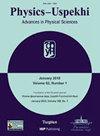Physics news on the Internet (based on electronic preprints)
IF 3.4
3区 物理与天体物理
Q1 PHYSICS, MULTIDISCIPLINARY
引用次数: 0
Abstract
H-C NaÈ gerl of Innsbruck University in Austria and his colleagues have for the first time observed three-particle bound quantum states whose existence was predicted theoretically by V I Efimov in 1970 already [Yadernaya Fizika 12 1080 (1970)] Ð in a rare example of the complex three-body problem allowing an exact analytical solution. A universal set of low-energy bound states appears for a system of three identical particles with a strong enough resonant two-body interaction. Interestingly, because of the quantum-mechanical nature of this effect, three-particle states can even exist in the absence of two-particle bound states. The size of the threeparticle system is much less than the absolute scattering length jaj, and the three-particle interactions are universal in character and independent of precisely how two particles interact when close together. The researchers studied in experiment a degenerate gas of caesium atoms held in an optical dipole trap at temperatures between 10 and 250 nK. The scattering length was controlled by a Feshbach resonance and could be varied over a wide range by tuning the external magnetic field. For a < 0, the Efimov states were identified by a sharp increase in atomic recombination losses in the trapÐ presumably due to the three-atom system rapidly decaying from the trimer state to the state involving a deeply bound dimer state plus a free atom. At a temperature of 10 nK, Efimov states appeared when the scattering length reached ÿ850 Bohr radii. Another type of Efimov state appeared for a > 0. In this case, recombination losses are much lower and exhibit in their spectrum a recombination minimum due to the destructive interference of the three-particle system's quantum decay channels. The position of the minimum agrees well with theoretical predictions. For a > 0, Efimov states arise due to Feshbach resonances in collisions between single atoms and dimers and can be interpreted as a threebody generalization to the Feshbach resonance concept. Source: Nature 440 315 (2006) http://arxiv.org/abs/cond-mat/0512394互联网上的物理新闻(基于电子预印本)
奥地利因斯布鲁克大学的H-C NaÈ gerl和他的同事首次观察到三粒子束缚量子态,这种量子态的存在已经在1970年被V I Efimov从理论上预测[yaderaya Fizika 12 1080 (1970)] Ð,这是一个罕见的允许精确解析解的复杂三体问题的例子。对于具有足够强的共振两体相互作用的三个相同粒子的系统,出现了一组普遍的低能束缚态。有趣的是,由于这种效应的量子力学性质,在没有两粒子束缚态的情况下,三粒子态甚至可以存在。三粒子系统的大小远小于绝对散射长度jaj,并且三粒子相互作用具有普遍性,并且与两个粒子靠近时如何相互作用完全无关。研究人员在实验中研究了一种铯原子的简并气体,这种气体被置于光学偶极子阱中,温度在10至250 nK之间。散射长度由费什巴赫共振控制,并且可以通过调节外部磁场在很大范围内变化。当a < 0时,Efimov态通过trapÐ中原子重组损失的急剧增加来确定,这可能是由于三原子体系从三聚体状态迅速衰减到涉及深结合二聚体状态和自由原子的状态。在10 nK的温度下,散射长度达到ÿ850玻尔半径时出现叶菲莫夫态。当a > 0时,出现另一种类型的Efimov状态。在这种情况下,由于三粒子系统的量子衰减通道的破坏性干涉,复合损失要低得多,并且在它们的光谱中表现出最小的复合。极小点的位置与理论预测非常吻合。当a > 0时,Efimov态是由单原子和二聚体碰撞中的费什巴赫共振引起的,可以解释为对费什巴赫共振概念的三体推广。来源:Nature 440315 (2006) http://arxiv.org/abs/cond-mat/0512394
本文章由计算机程序翻译,如有差异,请以英文原文为准。
求助全文
约1分钟内获得全文
求助全文
来源期刊

Physics-Uspekhi
物理-物理:综合
CiteScore
4.70
自引率
7.40%
发文量
60
审稿时长
6-12 weeks
期刊介绍:
Physics-Uspekhi (Advances in Physical Sciences) is a translation of the authoritative Russian-language review journal in physics, Uspekhi Fizicheskikh Nauk, first published in 1918. The papers cover a wide spectrum of the world''s scientific research in physics and associated fields by authors from France, Germany, United Kingdom, Italy, Japan, Sweden, the USA and other countries which successfully complement contributions by authors from Russia and other states of the former Soviet Union.
Physics-Uspekhi (Advances in Physical Sciences) covers:
Reviews of Topical Problems
Physics of Our Day
Instruments and Methods of Investigation
Methodological Notes
From the History of Physics
Conferences and Symposia
Book Reviews
Selected Physics News from the Internet.
 求助内容:
求助内容: 应助结果提醒方式:
应助结果提醒方式:


